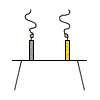These are a few ideas for beginning your Book of Shadows. It is by no means a comprehensive list, and there’s no reason for you to include everything here if you don’t want to.
Deity: Information on Gods and Goddesses in general; what each deity represents, as well as more detailed information on the God(s) and Goddess(es) that you feel a particular closeness with.
The Sabbats: Information on when the eight Sabbats are, and what things are associated with them, as well as the story they tell about the cycles of nature. You may wish to include rituals and activities for each specific day.
Continue reading “Book of Shadows”



